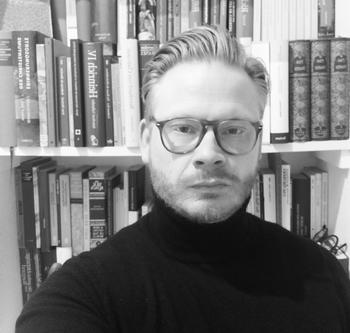Dr. Phillip Grimberg

Fellow in the project "Epochal Lifeworlds: Narratives of Crisis and Change"
Short Biography
Phillip Grimberg is a cultural historian specializing in the material cultures of late Imperial and contemporary China. He studied Chinese studies and International law at Universities in Germany (Cologne, Bonn) and China (Beijing, Hangzhou). After receiving his PhD in 2014 he held a number of research and teaching positions at different institutions (Bonn, Frankfurt, Erlangen, Naples, Trento) and is currently fellow at the Joint Center for Advanced Studies "Worldmaking from a Global Perspective: A Dialogue with China".
Project
In this World of Ours – Making Sense of Crisis and Disaster in Contemporary Taiwanese ArtWhen a massive earthquake hit Taiwan on September 21, 1999, more than 2.500 people died within the first few minutes of the disaster. Over twenty years later, avant-garde artists Beidiaibo 倍帝愛波 (Betty Apple), Qiu Linyao 邱琳窈 and Peng Yixuan 彭奕軒 collaborated in an exhibition called “Code Blue” (藍色警報) that was held at the Taibei Contemporary Art Centre (台北當代藝術中心) in March 2020. Although originally planned to commemorate the ´99 earthquake, under the impression of the emerging Covid-19 pandemic all three artists adapted their concepts to accommodate for the unfolding global health crisis, exploring “human strategies of coping with natural disaster and trauma“. Together with other members of Taiwan´s thriving art scene – and due to the strict safety restrictions put in place by Taiwanese authorities to prevent the disease from spreading – they developed concepts for remote and/or virtual enjoyment of their art. Performances, installations, video viewings, and readings were relegated to online, Covid-safe events that mirrored the lockdown situations the world has faced time and again over the course of the last year. While the pandemic altered the realities and perceptions of world and life beyond recognition for many people – albeit, hopefully, temporarily – Taiwan´s exceptionally successful containment strategies kept the virus at bay and the island nation safe from the tolls we see in other parts of the world. Nevertheless, the pandemic and its global impact on the artscapes of the Taiwanese capital informs the way artists engage with the world through mediated public and social discourse.
In this project I wish to conduct one month of fieldwork within Taibei's art community using both structured interviews and participant observation as the main data collection methods to gain insight into how the current pandemic has altered and/or influenced the sense of world and self among artists. In this I follow Nelson Goodman´s concepts of world and worldmaking as highly ductile constructs that allow for the invention, appropriation, and proliferation of different symbolic systems that constitute different worlds. This ontological concomitance provides a frame within which the artists construct and perceive their pre- and post-crisis „Worlds“. The main question that interests me in this context is how the artists understand the relationship between different kinds of worlds – natural, political, cultural, fictional, literary, linguistic, and virtual, and their susceptibility to crisis, change, and disaster.
